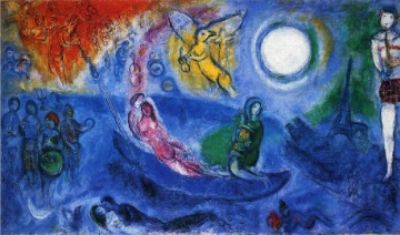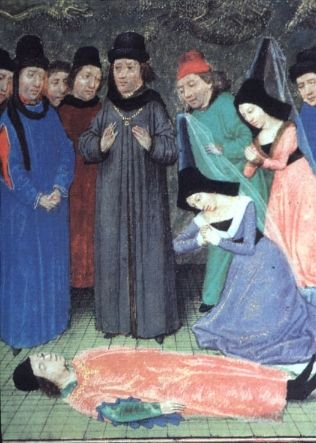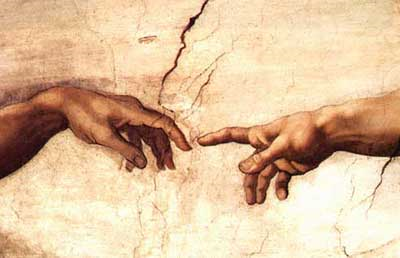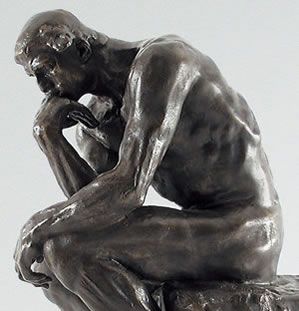We thank each and every one of you who have joined us for this Lenten Book Discussion of Proof of Heaven: A Neurosurgeon's Journey into the Afterlife by Dr. Eben Alexander and The Unlikely Pilgrimage of Harold Fry by Rachel Joyce.
This Sunday, March 10th, the Rev. Gary Jones will lead a much anticipated discussion on Proof of Heaven in the Rector's Forum. For more information, please visit our website.
A journey and a pilgrimage. It strikes us that though these two books have been, in many ways, quite distinct, both the fictional walk of Harold Fry and the first-person account of Dr. Alexander represent a shift in faith. Harold learns to love and trust in humanity, and in himself, and is eventually able to move love and trust back into their proper places in his marriage. Dr. Alexander experienced a life-altering immersion in the Divine love that flows from the Creator; a journey which impassioned him to expand his life's goal in order to share his experience and make others aware of that love.
As we walk with Jesus along the road to Calvary, we too are on a journey. Lent is a time for self examination and reflection, a time to reorder the bits and pieces of our lives of faith to better reflect our identities as the beloved of God. The rejoicing we anticipate on Easter is made all the more holy by our attempts to recognize and respect that which is holy within ourselves; the Christ within us that longs know and be known by us.
Knowing and being known. It seems to us that the yearning for that feeling of connection also lies at the heart of both of these books. We hope that you have found them a source of meaningful reflection and discussion, and we thank each and every one of you for your thoughtful comments and presence here with us.
We look forward to highlighting more books in this space in the future. Stay tuned!
Friday, March 8, 2013
Thursday, March 7, 2013
The Near Death Experience in History
Whatever else is happening in Proof of Heaven, it centers on a near death experience (or NDE). And whatever these experiences might be, from actual visions of heaven to the random firing of synapses and neurons under stress, most include the following elements (courtesy of HowStuffWorks.com):

The Concert by Marc Chagall
Dr. Alexander himself notes a few major differences between his journey and the "typical" NDE. Two of the largest were not having a sense of himself or knowledge of his identity while on the other side, as well as how the severity of the illness ravaging his body completely shut down almost all brain function. Nevertheless, he was astounded by the similarities he came across, particularly of "feeling the intensity of unconditional love" (p. 131).
Records of NDE-like experiences stretch back into ancient literature, which-- while not the same as ancient history-- still encompasses a valuable version of human experience.
In The Republic, dating from around 380 BC, Plato writes about a soldier named Er who was mistaken for dead and visits "the world beyond" before reawakening.
In medieval times such trips to the afterlife evolved into morality tales intended to inspire religious fervor. Hell was frightening, heaven was glorious, and woe betide the sinner who did not take note!
One particularly fascinating tale is "The Visions of the Knight Tondal," about a rakish Irish knight named Tondal who suffers a seizure and is taken on a journey of both heaven and hell before awakening. The Getty Museum has an interactive online exhibit of the only extant illustrated copy, dating from 1475.

Tondal Appears Dead: Simon Marmion, from The Visions of the Knight Tondal
Still, one leaves Proof of Heaven far more aware of the radical uniqueness of this entire event rather than how it fits in to all that has gone before. What, in particular, strikes you about the particulars of Dr. Alexander's experience? Was it how "deeply" he seemed to travel? Was it something he experienced while gone? Was it how the intensity of his illness should have made his recovery impossible?
- an intense, bright light
- a feeling of leaving the body
- movement into another realm
- spirit beings
- a tunnel
- communication with spirits
- a review of the major events in one's life

The Concert by Marc Chagall
Dr. Alexander himself notes a few major differences between his journey and the "typical" NDE. Two of the largest were not having a sense of himself or knowledge of his identity while on the other side, as well as how the severity of the illness ravaging his body completely shut down almost all brain function. Nevertheless, he was astounded by the similarities he came across, particularly of "feeling the intensity of unconditional love" (p. 131).
Records of NDE-like experiences stretch back into ancient literature, which-- while not the same as ancient history-- still encompasses a valuable version of human experience.
In The Republic, dating from around 380 BC, Plato writes about a soldier named Er who was mistaken for dead and visits "the world beyond" before reawakening.
In medieval times such trips to the afterlife evolved into morality tales intended to inspire religious fervor. Hell was frightening, heaven was glorious, and woe betide the sinner who did not take note!
One particularly fascinating tale is "The Visions of the Knight Tondal," about a rakish Irish knight named Tondal who suffers a seizure and is taken on a journey of both heaven and hell before awakening. The Getty Museum has an interactive online exhibit of the only extant illustrated copy, dating from 1475.

Tondal Appears Dead: Simon Marmion, from The Visions of the Knight Tondal
Still, one leaves Proof of Heaven far more aware of the radical uniqueness of this entire event rather than how it fits in to all that has gone before. What, in particular, strikes you about the particulars of Dr. Alexander's experience? Was it how "deeply" he seemed to travel? Was it something he experienced while gone? Was it how the intensity of his illness should have made his recovery impossible?
Wednesday, March 6, 2013
Proof of Heaven: Promises Made Real
Today we are joined by guest blogger Jen Thompson, a parishioner at St. Stephen's.
It seems to me that there is a promise in the underlying message of Dr. Eben Alexander’s momentous book, Proof of Heaven: A Neurosurgeon’s Journey into the Afterlife. It is a promise that can be realized now in our everyday lives. Beyond our human brain-power and rooted in our very soul, the promise that flowed to me from reading Proof of Heaven is this: We are deeply loved, protected, and guided by God – and that those truths are more real and concrete than anything else in our lives.

Detail from The Creation of Adam by Michelangelo
For me, this promise was gleaned from the soul-sense of recognition I felt as I read about Dr. Alexander’s journey beyond human life. He experienced, for the first time, the concept he calls “true thought” – something that resonated intensely with me. He writes that true thought is the thinking that is outside – and beyond – the brain; the thought that sparks unbounded inspiration, the peace experienced that is deeper than humanity, and the unexplainable sensation when we are sure that God is with us. I love this idea and know it to be true because I have felt it. In moments when I think of just the right sentence to perfectly complete an essay I’m struggling to finish, by the counsel I have given to a friend that even I am stirred by because it didn’t come from me despite my having spoken it, in the glimpses of strength I’ve had to hold on when human hope seems utterly lost. Alexander’s perception of true thought during his afterlife journey is an acknowledgement that each of us is genuinely spiritual. And that not only are we are intensely loved by a compassionate, personal God, but that we have the ability to tap into and cultivate the divinely true aspect of ourselves – “the being that God truly intends us to be,” Alexander writes – today, even now.
The other promise that Proof of Heaven gave me was a still, quiet peace about the beyond in a tangible way. The moment I finished it, I called my mom, who lost her husband of over 40 years and my dad, a few months ago, and suggested she go out and buy the book. Needless to say, in addition to occasionally shouting, “Yes, that’s it!” while reading the book, I smiled often in confirmation of its words, and a few times, I cried.

I’m not necessarily proud to admit that I’ve never paid a great deal of attention to afterlife stories and Near Death Experiences like the one Dr. Alexander experienced – they have always seemed so “out there” to me. That the journey into the afterlife described in Proof of Heaven occurred to Dr. Alexander, a world-renowned neurosurgeon trained at UNC-Chapel Hill, Duke and Harvard – and a life-long spiritual skeptic given his scientific training and study of the brain – is nothing short of miraculous. He is the first one to admit that he previously believed such “Near Death Experiences” (NDE) were medically explainable and caused by the mechanics of the brain, not anything spiritual. But in his case, medical explanations for his NDE are impossible given the particular type of damage that his brain suffered – a trauma that made his brain, essentially, dead and void of all consciousness. Alexander’s NDE case is the first recorded one of its kind – but it mirrors hundreds of others. For me, it added to my awe of God’s wisdom in tapping such a person to write this book.
I am humbled and grateful that Proof of Heaven came my way on the first day of Lent. There is so much to unravel and contemplate in this book. I’m delighted to have the opportunity to comment on it in St. Stephen’s book blog and am thrilled with anticipation for comments by others about their own journeys in reading Proof of Heaven.
It seems to me that there is a promise in the underlying message of Dr. Eben Alexander’s momentous book, Proof of Heaven: A Neurosurgeon’s Journey into the Afterlife. It is a promise that can be realized now in our everyday lives. Beyond our human brain-power and rooted in our very soul, the promise that flowed to me from reading Proof of Heaven is this: We are deeply loved, protected, and guided by God – and that those truths are more real and concrete than anything else in our lives.

Detail from The Creation of Adam by Michelangelo
For me, this promise was gleaned from the soul-sense of recognition I felt as I read about Dr. Alexander’s journey beyond human life. He experienced, for the first time, the concept he calls “true thought” – something that resonated intensely with me. He writes that true thought is the thinking that is outside – and beyond – the brain; the thought that sparks unbounded inspiration, the peace experienced that is deeper than humanity, and the unexplainable sensation when we are sure that God is with us. I love this idea and know it to be true because I have felt it. In moments when I think of just the right sentence to perfectly complete an essay I’m struggling to finish, by the counsel I have given to a friend that even I am stirred by because it didn’t come from me despite my having spoken it, in the glimpses of strength I’ve had to hold on when human hope seems utterly lost. Alexander’s perception of true thought during his afterlife journey is an acknowledgement that each of us is genuinely spiritual. And that not only are we are intensely loved by a compassionate, personal God, but that we have the ability to tap into and cultivate the divinely true aspect of ourselves – “the being that God truly intends us to be,” Alexander writes – today, even now.
The other promise that Proof of Heaven gave me was a still, quiet peace about the beyond in a tangible way. The moment I finished it, I called my mom, who lost her husband of over 40 years and my dad, a few months ago, and suggested she go out and buy the book. Needless to say, in addition to occasionally shouting, “Yes, that’s it!” while reading the book, I smiled often in confirmation of its words, and a few times, I cried.

I’m not necessarily proud to admit that I’ve never paid a great deal of attention to afterlife stories and Near Death Experiences like the one Dr. Alexander experienced – they have always seemed so “out there” to me. That the journey into the afterlife described in Proof of Heaven occurred to Dr. Alexander, a world-renowned neurosurgeon trained at UNC-Chapel Hill, Duke and Harvard – and a life-long spiritual skeptic given his scientific training and study of the brain – is nothing short of miraculous. He is the first one to admit that he previously believed such “Near Death Experiences” (NDE) were medically explainable and caused by the mechanics of the brain, not anything spiritual. But in his case, medical explanations for his NDE are impossible given the particular type of damage that his brain suffered – a trauma that made his brain, essentially, dead and void of all consciousness. Alexander’s NDE case is the first recorded one of its kind – but it mirrors hundreds of others. For me, it added to my awe of God’s wisdom in tapping such a person to write this book.
I am humbled and grateful that Proof of Heaven came my way on the first day of Lent. There is so much to unravel and contemplate in this book. I’m delighted to have the opportunity to comment on it in St. Stephen’s book blog and am thrilled with anticipation for comments by others about their own journeys in reading Proof of Heaven.
Monday, March 4, 2013
Playing Devil's Advocate
Proof of Heaven was chosen for the Lenten Book Club largely because of how strongly it resonated with some parishioners and staff members on first reading. In both David's thoughtful guest post and the resulting comments, it has been suggested that "proof" is somewhat beside the point for many readers. The takeaway, for many, is on how a man dedicated to logic and rationality could experience and embrace the intuitive knowledge many believers have: that "None of us are ever unloved. Each and every one of us is deeply known and cared for by a Creator who cherishes us beyond any ability we have to comprehend." (p. 96)
However, it is entirely possible to read Proof of Heaven and be left not with a sense of peace or comfort, but a sour taste in the mouth. What of readers who engage with Dr. Alexander and his journey and are left cold?

The Thinker by Auguste Rodin
When we recite the creeds during worship, we are making concrete statements of belief based entirely on faith, including that Jesus is the son of God, who lived and died as one of us, rose again, went to be with the Father in Heaven, and will return. An immense portion of Jesus' message centers on the wonderful fact of God's unconditional love, but as Christians our scripture, doctrine, and creeds are far more specific than Dr. Alexander is willing to be. A vision of heaven without reference to Jesus is understandably difficult for many.
Dr. Alexander also says much about how the ultimate message of our connection to all beings and the Creator must be made known, but to what end? The Gospels contain both implicit and explicit commands that we go forth and not only love our neighbors as ourselves but care for the least, the last, and the lost. Is it not legitimate to consider the potential emptiness of reading and embracing Dr. Alexander's message without the associated push for social justice found throughout the New Testament?
It is true that believers don't need for Dr. Alexander to repeat or underline what has already been laid out by the Bible. However, part of the appeal of his message is his own movement from non-belief in God to belief in God. Proof of Heaven is number one on this week's New York Times list of best-selling paperback nonfiction. One cannot help but consider how some will be themselves moved to belief through his story. Many Christians will take heart in that fact, but others might see it as the embracing of a surface message with very little substance.
What might you say to someone left feeling uneasy after reading Proof of Heaven? Is it legitimate to consider questions and concerns like those above?
However, it is entirely possible to read Proof of Heaven and be left not with a sense of peace or comfort, but a sour taste in the mouth. What of readers who engage with Dr. Alexander and his journey and are left cold?

The Thinker by Auguste Rodin
When we recite the creeds during worship, we are making concrete statements of belief based entirely on faith, including that Jesus is the son of God, who lived and died as one of us, rose again, went to be with the Father in Heaven, and will return. An immense portion of Jesus' message centers on the wonderful fact of God's unconditional love, but as Christians our scripture, doctrine, and creeds are far more specific than Dr. Alexander is willing to be. A vision of heaven without reference to Jesus is understandably difficult for many.
Dr. Alexander also says much about how the ultimate message of our connection to all beings and the Creator must be made known, but to what end? The Gospels contain both implicit and explicit commands that we go forth and not only love our neighbors as ourselves but care for the least, the last, and the lost. Is it not legitimate to consider the potential emptiness of reading and embracing Dr. Alexander's message without the associated push for social justice found throughout the New Testament?
It is true that believers don't need for Dr. Alexander to repeat or underline what has already been laid out by the Bible. However, part of the appeal of his message is his own movement from non-belief in God to belief in God. Proof of Heaven is number one on this week's New York Times list of best-selling paperback nonfiction. One cannot help but consider how some will be themselves moved to belief through his story. Many Christians will take heart in that fact, but others might see it as the embracing of a surface message with very little substance.
What might you say to someone left feeling uneasy after reading Proof of Heaven? Is it legitimate to consider questions and concerns like those above?
Friday, March 1, 2013
Proof of Heaven: Conviction and Relief
I don’t know what it is about us 21st century folks, but we want to see evidence of things that our ancestors readily accepted on faith. You have to prove to us that a virgin can give birth, that bodily resurrection is possible, that there’s a heaven, or that God even exists in this era of tsunamis and brutal dictatorships. Many have joined the ranks of the atheists or the non-churchgoing secularists when such definitive proof was not forthcoming. Indeed, even churchgoing Christians can secretly yearn for scientific and empirical reinforcement of our religious beliefs and are disappointed when such support is lacking.

To the rescue comes Dr. Eben Alexander. My first reaction was: he’s one of us: Virginia resident, Episcopalian, professional, 1976 UNC graduate (OK, that only resonates with me), social drinker (reformed), etc. He even mentions 2 close friends of mine in the first chapter of the book as being among his closest friends. So, in contrast with the anonymous accounts of near death experiences, this account was experienced by someone I may have met at some point in my life and who would fit right in at St. Stephen’s or at a Richmond cocktail party. My second reaction was that his account is far more than the out-of-body, light-at-the-end-of-the-tunnel accounts that we have all heard and read about. It is detailed, it is vivid, it is magical, and he leaves the reader wishing for more – to the point of forgetting that his tour of heaven is taking place while family and friends are praying for his far-from-certain recovery. Lastly, because of his medical training and natural skepticism, Dr. Alexander had every reason to question his experience, yet could only conclude that it was indeed heaven that he experienced. There simply was no scientific explanation.
What resonates most of all, however, is that Dr. Alexander’s account just sounds right. It feels right. His description of an existence after this earthly life simply rings true. It’s consistent with Jesus’ teachings without being theological or even Christian. And I suspect that it’s consistent with other faiths as well. And it’s more than just wishful thinking, although everyone who reads Proof of Heaven wishes it were true. So, for me, Proof of Heaven has inspired a sense of conviction and even relief because deep down inside, it simply makes sense.
Subscribe to:
Posts (Atom)